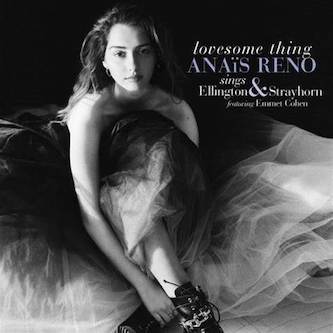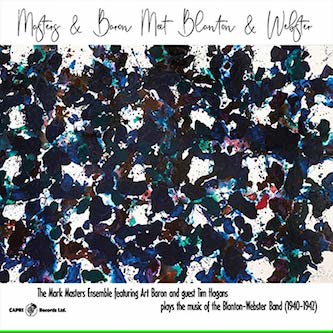Jazz Album Review: Superb Celebrations of the Music of Duke Ellington and Billy Strayhorn
By Michael Ullman
Vocalist Anaïs Reno and Mark Masters and his big band supply compelling homages to the brilliance of Duke Ellington and Billy Strayhorn.
Anaïs Reno Sings Ellington & Strayhorn (Harbinger Records)
Mark Masters Ensemble, Masters & Baron Meet Blanton and Webster (Capri Records)

Both of these tributes draw on some of the best compositions by Duke Ellington and Billy Strayhorn. Mark Masters reworks 11 pieces for his big band; more remarkable, because of its wide ranging selection of tunes as well as the convincing authority and joyful musicality of its vocalist, is the debut recording of the now 17 year old singer Anaïs Reno. (She was sixteen when recording was made).
The Ellington-Strayhorn story goes back to the late ’30s. In 1938, Billy Strayhorn was 23. He was already a composer, but was unknown aside from those in the know around his home town, Pittsburgh. Someone led him backstage to meet his hero, Duke Ellington. He impressed Duke with his playing as well as his lyrics and compositions (perhaps his respectful manner was also a help). Soon Ellington was handing the younger man assignments. Their musical relationship grew and deepened: they eventually became co-composers, and more. Ellington once described Strayhorn as his right arm, his other heartbeat.
Crucial though he was, Strayhorn wasn’t the only pivotal newcomer to the Ellington band in the late ’30s. In October, 1939, bassist Jimmie Blanton, then 21, became a member of the orchestra. Performing on the bass with a rapid, agile pizzicato (almost like a guitar), he helped revolutionize the sound of the instrument. Ellington immediately knew what to do with him: they made duet recordings in 1939 and 1940. Blanton plays the introduction to “Jack the Bear” and also has key passages towards the end of “Ko-Ko.” There was another addition to this band that many point to being among Ellington’s finest choicest: tenor saxophonist Ben Webster, a supremely lyrical player who would be featured on ballads like “All Too Soon” and “Chelsea Bridge.” He was a powerhouse too, as can be heard in his dynamic solo on “Cottontail.”
The Webster-Blanton band lasted until 1942, when a recording ban virtually coincided with the death of Blanton. It’s this band, and its many recordings, that Mark Masters and his ensemble celebrates via a reworking of Ellington’s heralded recordings. The tunes include “Jack the Bear” and Strayhorn’s “Passion Flower,” alongside some less (predictably) interesting pieces, such as “Duke’s Place” and “In a Mellotone.” The trombone of Art Baron — who was in Ellington’s last band — is featured, as well as trumpeter Tim Hagans. Baron is given the task of playing the parts originally performed by growling master “Tricky Sam” Nanton and Ellington’s master of romance, trombonist Lawrence Brown. It’s a tall order, though no less than the challenge posed to Masters, who must make this material sound new without totally losing what Strayhorn deemed the “Ellington Effect.” The Duke’s recording of “Jack the Bear,” for instance, begins with a couple of short phrases by brass and then reeds before Blanton bursts in in startling fashion. The rest of the initial chorus presents an unusual ‘conversation’ between Ellington and band. The solos are short, and they are frequently backed up by the troupe tossing off an elemental riff via an eccentric sounding crescendo. Master’s version of “Jack the Bear” starts with a brief statement of the melody, much as Ellington plays it towards the end. Soon, though, we hear the trombone soloing over the brushes of Mark Ferber. The fact is, it’s a much simpler version than Ellington’s, but imitation would have gotten Masters nowhere.
Ellington’s studio recording of “Ko-Ko” begins with four evenly spaced eighth notes. It’s an eerie piece that includes, towards its end, radically dissonant riffs from the bandleader on piano. Dancers — Ellington was mostly playing dances in the early ’40s — didn’t know what to do with this menacing-sounding piece, which was originally meant to be part of a ballet. (Ellington played it faster and faster in live performances, losing its threatening quality without gaining much in return.) Masters starts with a trumpet solo over a walking bass line. Baron enters with wah-wah effects over the band. Interestingly, one wouldn’t know this was “Ko-Ko” until near its end. “What Am I Here For” again kicks off with a trumpet solo. Later, two trumpets trade fours in an unfortunately languid manner. Mostly though, Masters has risen to the challenge. His dissonant introduction to “Take the A Train” is amusing, as is his nimble editing of the melody. His “Passion Flower” is restrained, as one would expect, taken at an effectively crawling tempo. But Johnny Hodges’s solo is missed.
 Accompanied by pianist Emmet Cohen’s small band, singer Anaïs Reno begins her album daringly. She scats over the familiar Juan Tizol melody “Caravan.” Over all hers is a bold, as well as nuanced, performance, drawing on a vocal skill that (almost) conceals itself. Reno uses dynamics subtly, for instance, working in a slight crescendo and then adding a bit of vibrato, when singing “within a desert caravan..” She pauses a brief moment before singing the key word “love,” and introduces the saxophone solo with an inviting full stop. She follows this tour de force with a fine rendition of the ballad “Mood Indigo.” Almost every phrase she sings is emotionally varied, yet she never sounds mannered. She can sound brassy or innocent, subtle or straightforward.
Accompanied by pianist Emmet Cohen’s small band, singer Anaïs Reno begins her album daringly. She scats over the familiar Juan Tizol melody “Caravan.” Over all hers is a bold, as well as nuanced, performance, drawing on a vocal skill that (almost) conceals itself. Reno uses dynamics subtly, for instance, working in a slight crescendo and then adding a bit of vibrato, when singing “within a desert caravan..” She pauses a brief moment before singing the key word “love,” and introduces the saxophone solo with an inviting full stop. She follows this tour de force with a fine rendition of the ballad “Mood Indigo.” Almost every phrase she sings is emotionally varied, yet she never sounds mannered. She can sound brassy or innocent, subtle or straightforward.
Her repertoire is remarkable. The only recording I know of “All Roads Lead Back to You,” the vocal version of “Lotus Blossom,” is by Andy Bey, and it’s out of print. As sung by Reno, it’s a regretful, but hardly tragic, song. She sings of the roads that “bring me closer to you” with a full-bodied sound, but then modulates to near whisper with the lyric: “ For there on my solo flight, I thought of you day and night. ” The lyrics are amusing: “I thought that a trip/ Would give love the slip.” It doesn’t, of course. In 1947, Nat King Cole recorded “It’s Kind of Lonesome Out Tonight.” It’s a beautiful song that has rarely been recorded since. Reno may bring it back into the repertoire. In this outing, Reno is relaxed, touching in a laconic way. She is accompanied by solo piano. Just as obscure a song is the bouncy “Still in Love,” with its wise guy lyrics: “but alack and alas, I am back where I started from — still in love with you.”
Legend has it that Strayhorn brought his through-composed ballad “Lush Life” to Ellington at their first meeting. He seems to have finished this hymn to premature disillusionment in 1936 when he was twenty-one. The tune tells a complicated story. The singer used to hang out in all the hip places to “get the feel of life,” a lyric that Reno sings softly, purely. “Then you came along with your siren song/ to tempt me to madness.” It’s not clear what the madness is, but the singer sees this new lover as ”tinged with the sadness of a great love for me.” “Ah yes, I was wrong,” Reno whispers, and then adds a sardonic “again.” Strayhorn was proud of his French, and he wrote of the song’s barflies as having “sad and sullen grey faces/ With distingué traces.” Nat King Cole’s 1949 recording changed that second phrase to the nonsensical “with distant grey traces.” Unfortunately, Reno follows Cole in this misreading. As she does throughout the song, Reno manipulates dynamics and rubato in a masterful fashion: her shifts in technique are always appropriate. In “Lush Life” she sings “I’ll forget you” in an almost a spoken manner, but then flares up with a powerful “You are still burning inside my brain.” There’s more in this set of course, including a forthright, brassy version of the ballad “Day Dream” and a happily upbeat version of “Take the A Train” to end the album. This is a memorable debut recording from a young singer who is so lavishly talented.
Michael Ullman studied classical clarinet and was educated at Harvard, the University of Chicago, and the U. of Michigan, from which he received a PhD in English. The author or co-author of two books on jazz, he has written on jazz and classical music for the Atlantic Monthly, New Republic, High Fidelity, Stereophile, Boston Phoenix, Boston Globe, and other venues. His articles on Dickens, Joyce, Kipling, and others have appeared in academic journals. For over 20 years, he has written a bi-monthly jazz column for Fanfare Magazine, for which he also reviews classical music. At Tufts University, he teaches mostly modernist writers in the English Department and jazz and blues history in the Music Department. He plays piano badly.
Tagged: Anaïs Reno, Anaïs Reno Sings Ellington and Strayhorn, Billy Strayhorn, Capri Records, Duke Ellington, Harbinger Records
